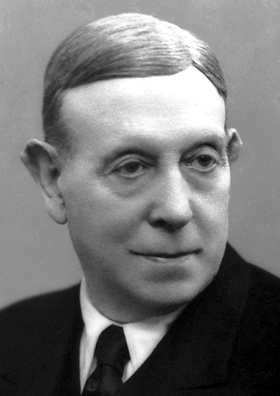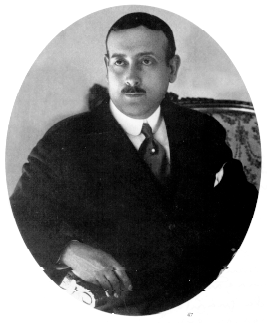<Back to Index>
- Neurologist António Caetano de Abreu Freire Egas Moniz, 1874
- Writer Wilhelm Hauff, 1802
- 5th Chancellor of the German Empire Theobald von Bethmann Hollweg, 1856
PAGE SPONSOR


António Caetano de Abreu Freire Egas Moniz (29 November 1874 – 13 December 1955), known as Egas Moniz, was a Portuguese neurologist and the developer of cerebral angiography. He is best known for introducing the controversial psychosurgical procedure leucotomy (also known as lobotomy), for which he became the first Portuguese national to receive a Nobel Prize in 1949 (shared with Walter Rudolf Hess).
He
held academic positions, wrote many medical articles and also served in
several legislative and diplomatic posts in the Portuguese government.
In 1911 he became professor of neurology in Lisbon until his retirement in
1944. At the same time, he pursued a demanding political career. Moniz was born in Avanca, Estarreja,
Portugal, as António Caetano de Abreu Freire Egas Moniz. He
attended Escola do Padre José Ramos and Colégio de S.
Fiel dos Jesuítas, studied medicine at the University of Coimbra, then trained in neurology in
Bordeaux and Paris. In 1902, he became professor at the Department of
Neurology, but soon left that post on entering politics in 1903. He
established the Partido Republicano Centrista and represented it in the Portuguese parliament from
1903 to 1917. Later he was Portugal's ambassador to Madrid (1917) and
minister of foreign affairs (1918). Meanwhile he continued to practice
medicine and teach physiology and anatomy, and in 1911 he became a professor of neurology at the newly established University of Lisbon. In 1920, he gave up politics and returned to medicine and writing full time. In 1927 Moniz developed cerebral angiography,
a technique allowing blood vessels in and around the brain to be
visualized; in various forms it remains a fundamental tool both in
diagnosis and in the planning of surgeries on the brain. For this, he was nominated twice for the Nobel Prize. He also contributed to the development of Thorotrast for use in the procedure and contributed many lectures and papers on the subject. He is considered a pioneer in the field. In 1936, he published his first report of performing a prefrontal leukotomy on a human patient, and subsequently devised the leucotome for
use in the procedure. He judged the results acceptable in the first 40
or so patients he treated, claiming, "Prefrontal leukotomy is a simple
operation, always safe, which may prove to be an effective surgical
treatment in certain cases of mental disorder." He
also claimed that the benefits, even if some behavioral and personality
deterioration occurred, were outweighed by what he saw as reduction in
the debilitating effects of the illness. But
he conceded that patients who had already deteriorated from the mental
illness did not benefit much, and he did no long term follow up. The
procedure enjoyed a brief vogue, and in 1949 he received the Nobel Prize, "for his discovery of the therapeutic value of leucotomy in certain psychoses." In 1939, Moniz was shot by a disaffected patient and subsequently confined to a wheelchair. He continued in private practice until 1955, when he died just as his procedure was falling into disrepute.
Since fallling almost completely from use in the 1960s, leucotomy (also known as
lobotomy) has been deplored by many as brutally arrogant, and collateral derision has been directed at Moniz as its inventor. Others
suggest judging the inventor separately from the invention,
characterizing Moniz' work as a "great and desperate" attempt to find
effective treatment for severe forms of mental illness for which there
was at the time no effective treatment at all. Some claim it was aggressive promotion of lobotomy by other doctors (such as Walter Freeman) which led to its being performed in large numbers of cases now considered inappropriate. In
1957 Moniz's study centre, now known as the Egas Moniz Museum, was
transferred to Santa Maria Hospital, and integrated in the Faculty of
Medicine of the University of Lisbon, where there is also a statue of
him. His art collection is on display at his country house in Avanca.
The anatomical feature Egas Moniz's Siphon, the passage of the internal carotid artery through the interior of the temporal bone, is named for him.